Learn Korean: Korean Grammar 109: V-은 적이 있다/없다, ㄴ 적이 있다/없다, V-아 본 적이 있다/-어 본 적이 있다/-해 본 적이 있다
In this lesson, we're going to learn 'V-은 적이 있다/없다, ㄴ 적이 있다/없다, V-아 본 적이 있다/-어 본 적이 있다/-해 본 적이 있다'
제주도에 간 적이 있어요.
If you want to watch the lesson in Korean with English subtitles, please click the link below.
🎬 Korean Grammar 109: https://youtu.be/w8QprGR06hA
1. 1. A short conversation & Pronunciation
- 나나: 미소 씨, 제주도에 가 봤어요?
(Miso, have you been to Jeju Island?)
(Miso, have you been to Jeju Island?)
- 미소: 네, 친구들이랑 제주도에 간 적이 있어요. 나나 씨는요?
(Yes, I have been to Jeju Island with my friends. How about you, Nana?)
(Yes, I have been to Jeju Island with my friends. How about you, Nana?)
- 나나: 저는 제주도에 가 본 적이 없어요. 한번 가 보고 싶어요.
(I have never been to Jeju Island. I would like to go there once.)
(I have never been to Jeju Island. I would like to go there once.)
Here, the grammar we will learn today is '간 적이 있어요 and 가 본 적이 없어요'.
2. Usage
► '은/ㄴ 적이 있다/없다' attaches after a verb stem.
► It is the combination of (으)ㄴ + 적 + 이 + 있다/없다.
- (으)ㄴ is an ending of a word that indicates an event or action has occurred in the past,
- (으)ㄴ is an ending of a word that indicates an event or action has occurred in the past,
- 적 is a bound noun to time in the past,
- 이 is a particle that can be omitted,
- 있다/없다 are adjectives.
► As one expression, it is used to talk about past experiences.
- Example Sentences
(1) Verb + ㄴ 적이 있다/없다
✎ 미소 씨는 제주도에 간 적이 있어요. (가다 + ㄴ 적이 있다)
(Miso has been to Jeju Island.)
(Miso has been to Jeju Island.)
- '간 적이 있어요' is the combination of the verb '가다' and 'ㄴ 적이 있다.'
- Miso 'went (갔어요)' to Jeju Island. She has an 'experience' of going to Jeju Island.
- In this case, you can use ‘ㄴ 적이 있다’ after the verb '가다.'
- Miso 'went (갔어요)' to Jeju Island. She has an 'experience' of going to Jeju Island.
- In this case, you can use ‘ㄴ 적이 있다’ after the verb '가다.'
✎ 나나 씨는 제주도에 간 적이 없어요. (가다 + ㄴ 적이 없다)
(Nana has never been to Jeju Island.)
- '간 적이 없어요' is the combination of the verb '가다' and 'ㄴ 적이 있다.'
- Nana did not go (안 갔어요)' to Jeju Island. She has no 'experience' to go to Jeju Island.
- In this case, you can use ‘ㄴ 적이 없다’ after the verb '가다.'
(Nana has never been to Jeju Island.)
- '간 적이 없어요' is the combination of the verb '가다' and 'ㄴ 적이 있다.'
- Nana did not go (안 갔어요)' to Jeju Island. She has no 'experience' to go to Jeju Island.
- In this case, you can use ‘ㄴ 적이 없다’ after the verb '가다.'
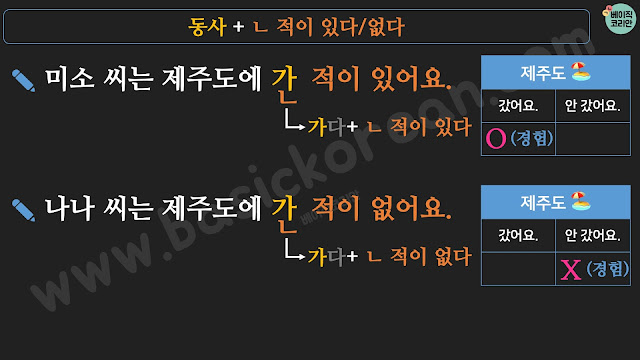 | |
|
(2) Verb + 은 적이 있다/없다
✎ 미소 씨는 불고기를 먹은 적이 있어요. (먹다 + 은 적이 있다)
(Miso has had bulgogi before.)
- '먹은 적이 있어요' is a combination of the verb '먹다' and '은 적이 있다'.
- Miso 'ate (먹었어요)' bulgogi. She has an 'experience' of eating bulgogi.
- In this case, you can use ‘은 적이 있다’ after the verb '먹다.'
(Miso has had bulgogi before.)
- '먹은 적이 있어요' is a combination of the verb '먹다' and '은 적이 있다'.
- Miso 'ate (먹었어요)' bulgogi. She has an 'experience' of eating bulgogi.
- In this case, you can use ‘은 적이 있다’ after the verb '먹다.'
✎ 나나 씨는 불고기를 먹은 적이 없어요. (먹다 + 은 적이 없다)
(Nana has never eaten bulgogi.)
(Nana has never eaten bulgogi.)
- '먹은 적이 없어요' is a combination of the verb '먹다' and '은 적이 없다'.
- Nana 'did not eat (안 먹었어요)' bulgogi. She has no 'experience' of eating bulgogi.
- In this case, you can use ‘은 적이 없다’ after the verb '먹다.'
- Nana 'did not eat (안 먹었어요)' bulgogi. She has no 'experience' of eating bulgogi.
- In this case, you can use ‘은 적이 없다’ after the verb '먹다.'
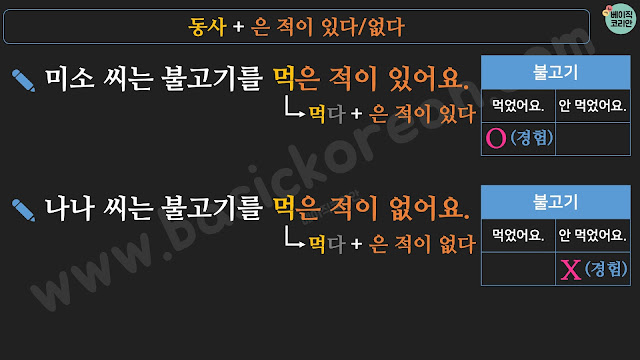 | |
|
3. Related expression: V-아/어/해 본 적이 있다/없다
► Verb stem + -아/어/해 보다 (try) + ㄴ 적이 있다/없다 (experience)
- This expression the combination of a verb stem with '아/어/해 보다' which expresses 'try or attempt' and today's grammar ‘ㄴ 적이 있다/없다’ which expresses 'experience.'
- This expression the combination of a verb stem with '아/어/해 보다' which expresses 'try or attempt' and today's grammar ‘ㄴ 적이 있다/없다’ which expresses 'experience.'
► As one expression, it is used to talk about past experiences.
► It is also used to describe experiences of trying something in the past.
► So it usually talks about positive experiences or experiences that the speaker wants to do. So it can be a little awkward when combined with unintended verbs
- Example Sentences
✎ 미소 씨는 제주도에 가 본 적이 있어요. (가다 + 아 보다 + ㄴ 적이 있다)
(Miso has been (has tried to go) to Jeju Island before.)
- '가 본 적이 있어요' is a combination of the verb '가다', '아 보다', and ' 적이 있다'.
- It's talking about past experience.
- It's talking about past experience.
✎ 미소 씨는 불고기를 먹어 본 적이 있어요. (먹다 + 어 보다 + ㄴ 적이 있다)
(Miso has eaten (has tried to eat) bulgogi before.)
- '먹어 본 적이 있어요' is a combination of the verb '먹다', '어 보다', and 'ㄴ 적이 있다'.
- It's talking about past experience.
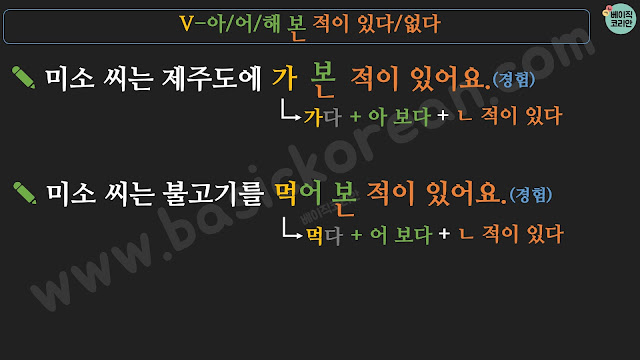 |
| V-아 본 적이 있다/-어 본 적이 있다/-해 본 적이 있다 |
4. Combination Information
- It attaches after a verb stem.
- When the verb stem has the final consonant, '은 적이 있다/없다' is used.
1) Final Consonant O: -은 적이 있다/없다
- 먹다 + 은 적이 있다/없다 → 먹은 적이 있다/없다
- When a verb stem does not have the final consonant, 'ㄴ 적이 있다/없다' is used.
2) Final Consonant X: -ㄴ 적이 있다/없다
- 가다 + ㄴ 적이 있다/없다 → 간 적이 있다/없다
- When an verb stem ends with the final consonant ‘ㄹ’, delete ‘ㄹ’ and attach ‘ㄴ 적이 있다’.
3) Final Consonant ㄹ: ㄹ drop + ㄴ 적이 있다/없다
- 만들다 (ㄹ drop) + ㄴ 적이 있다/없다 → 만든 적이 있다/없다
* Summary
4. Practice
(V-은/ㄴ 적이 있다/없다)
✎ 저는 한국어를 배운 적이 있어요. (배우다 + ㄴ 적이 있다)
(I've learned Korean.)
(I've learned Korean.)
✎ 저는 윤동주 시인의 시를 읽은 적이 있어요. (읽다 + 은 적이 있다)
(I have read poems by Yun Dong-joo.)
(I have read poems by Yun Dong-joo.)
✎ 저는 김치를 만든 적이 없어요. (만들다 (ㄹ탈락) + ㄴ 적이 없다)
(I've never made kimchi.)
(I've never made kimchi.)
(V-아/어/해 본 적이 있다/없다)
✎ 저는 한복을 입어 본 적이 있어요. (입다 + 어 보다 + ㄴ 적이 있다)
(I have experience of wearing Hanbok.)
(I have experience of wearing Hanbok.)
✎ 저는 스키를 타 본 적이 있어요. (타다 + 아 보다 + ㄴ 적이 있다)
(I've been skiing before.)
(I've been skiing before.)
✎ 저는 한국에서 운전해 본 적이 없어요. (운전하다 + 해 보다 + ㄴ 적이 없다)
(I have not tried to drive in Korea.)
(I have not tried to drive in Korea.)
(A short conversation & Pronunciation)
- 미소: 나나 씨, 불고기 먹어 봤어요?
(Nana, have you tried bulgogi?)
(Nana, have you tried bulgogi?)
- 나나: 네, 불고기는 먹은 적이 있어요.
(Sure. I've eaten bulgogi before.)
(Sure. I've eaten bulgogi before.)
- 미소: 그러면, 산낙지는요?
(Then, what about a live octopus?)
(Then, what about a live octopus?)
- 나나: 산낙지는 한 번도 먹어 본 적이 없어요.
(I've never eaten a live octopus before.)
(I've never eaten a live octopus before.)
→ 먹은 적이 있어요. (먹다 + 은 적이 있다)
→ 먹어 본 적이 없어요. (먹다 + 어 보다 + ㄴ 적이 없다)
Thank you~!
#베이직코리안 #한국어문법 #Basickorean #Koreangrammar
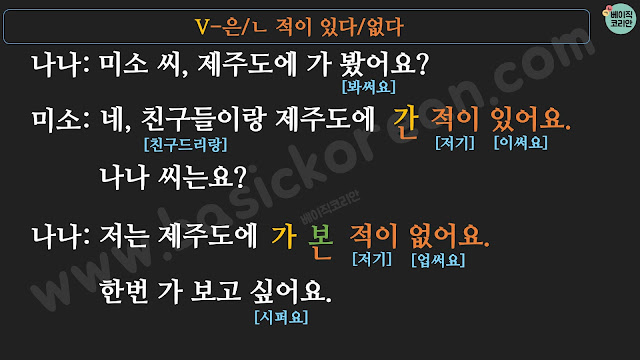
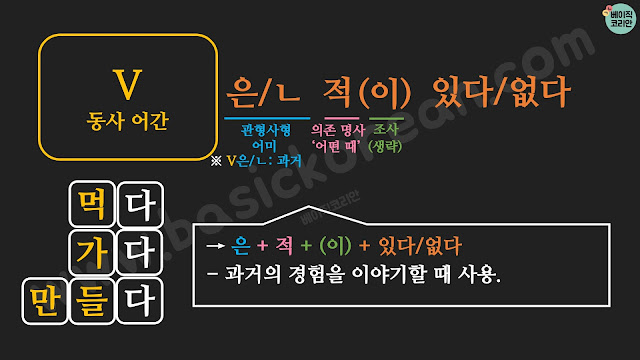


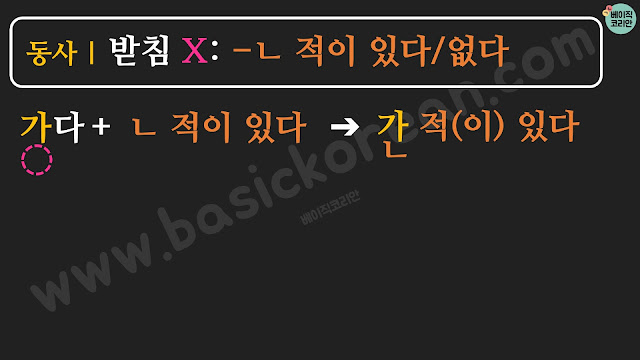
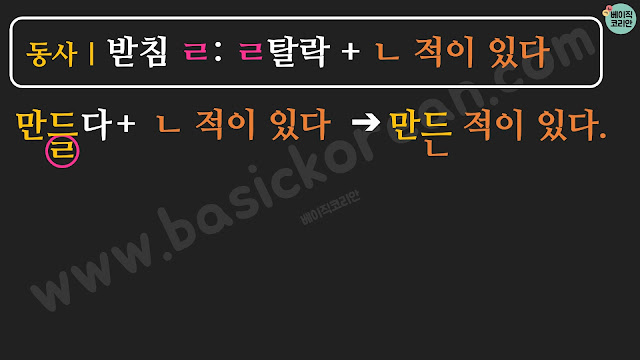



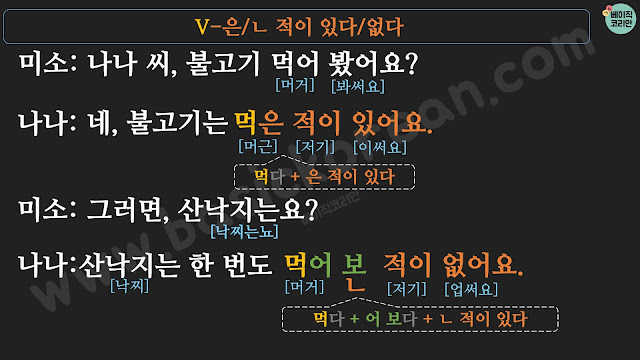
_basickorean.jpg)
